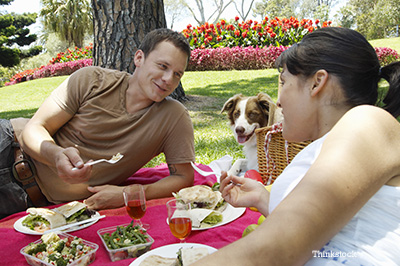Dr. Justine Lee has some great tips to keep your dog safe during summer festivities. For more from Dr. Lee, find her on Facebook!
Ah, summer…the start of backyard BBQs and picnics outside. While I want to encourage you to spend more time outside with your pooch and your family, keep in mind that when picnicking, there are several dangerous food items that can pose a threat to your dog when accidentally ingested. More importantly, make sure your friends and family are aware of these risks to your dog, and advise them to never feed your dog any snacks without your permission.
Before you set that picnic blanket down, make sure your dog can’t get into the following dangerous or poisonous table foods:
- Grapes and raisins
- Baked goods containing xylitol
- Corn on the cob
- Peach pits
- Fatty table snacks or bones
By just being aware of these 5 picnic dangers, you can save yourself a several thousand dollar veterinary bill and an emergency trip to the veterinarian!
Grapes and Raisins
and Raisins
Anything containing grapes and raisins (and even currants) are considered to be poisonous to dogs. Common picnic items like grapes, baked goods containing raisins (e.g., oatmeal raisin cookies), and trail mix all pose a threat. While one or two grapes are unlikely to cause a problem (depending on the size of the dog), accidental ingestion of the Vitus spp. can result in the following signs:
- vomiting,
- abdominal pain,
- inappetance,
- diarrhea,
- lethargy,
- excessive or decreased thirst or urination, and
- acute kidney failure
Unfortunately, clinical signs often aren’t obvious until days later, when it’s more costly – and more dangerous – to your pet. Treatment includes decontamination, aggressive intravenous (IV) fluids, anti-vomiting medication, blood pressure monitoring, urine output monitoring, and blood work monitoring (to check kidney function).
Xylitol
Xylitol is a natural sugar substitute that is poisonous to dogs. While safe for humans, when accidentally ingested by non-primate species, xylitol can result in an insulin spike by the body (with a secondary life-threatening drop in blood sugar). So, if you have any baked goods, candies, mints, gums, etc. that contain xylitol, keep them out of reach of your dog. Clinical signs of xylitol poisoning can be seen as early as 15-30 minutes, and include:
- weakness,
- vomiting,
- collapse, and
- lethargy (which are all signs of a low blood sugar).
Really high doses of xylitol can result in liver failure in dogs, and include signs of black tarry stool, jaundice (e.g., yellowing of the gums), malaise, walking drunk, and rarely, seizures and death. Treatment includes decontamination, blood sugar monitoring, dextrose supplementation, drugs to protect the liver, and monitoring liver function.
Foreign Bodies: Corn On the Cob and Peach Pits
While corn on the cob and peach pits aren’t poisonous per se, these two common picnic items are very dangerous to dogs. Both of these leftover garbage scraps can easily get stuck in the intestines and require an expensive abdominal surgery to remove. Corn on the cob is notorious for being difficult to detect on x-rays, as the density doesn’t show up well. This makes it harder to diagnose, and potentially more life-threatening to your dog. Never feed your dog corn on the cob – if you want, slice the kernels off for him instead. Clinical signs of foreign body obstructions include:
- vomiting,
- drooling (from nausea),
- abdominal pain,
- decreased stool production,
- inappetance, and
- lethargy.
Believe it or not, left untreated, these picnic foods can cause the intestines to rupture and, potentially, death.
Fatty Table Snacks and Bones
Leftover BBQ bits (like bones, gristle, and fat) and bones should never be given to your dog… especially if you own an overweight dog or one of these breeds: Yorkshire terrier, miniature schnauzer, or Shetland sheepdog. Why? Overweight dogs and certain breeds are particularly predisposed to pancreatitis, inflammation of the pancreas. This organ breaks down fat, and when overstimulated from a fatty meal, can result in the following clinical signs:
- vomiting,
- abdominal pain,
- fever,
- diarrhea,
- weakness,
- inappetance, and
- death (from organ failure).
When in doubt, keep these picnic items out of reach. Keep in mind that the sooner that you recognize that your pet is poisoned, the easier it is to treat and the less dangerous (and less expensive) it is to your dog. Enjoy your summer with your dog, but pay heed to these common picnic pet emergencies!
If you have any questions or concerns, you should always visit or call your veterinarian – they are your best resource to ensure the health and well-being of your pets.
